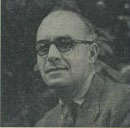Henry Treece
Henry Treece Poems
Across the road the homesick Romans made
The ground-mist thickens to a milky shroud;
Through flat, damp fields call sheep, mourning their dead
In cracked and timeless voices, unutterably sad,
...
Through the dark aisles of the wood
Where the pine-needles deaden all sound
And the dove flutters in the black boughs
...
In the dark caverns of the night,
Loveless and alone,
Friendless as wind that wails across the plains,
I sit, the last man left on earth,
...
In this sad place
Memory hangs on the air
Fragile as Spring snail's tiny shell,
Coming to the sympathetic ear
...
Death walks through the mind's dark woods,
Beautiful as aconite,
A lily-flower in his pale hand
And eyes like moonstones burning bright.
...
They shall come in the black weathers
From the heart of the dead embers,
Walking one and two over the hill.
...
In that stone head, obscenity
Has been preserved a thousand years;
A bible-leaf of families
Have shuddered at the pointed ears.
...
How do I love you then?
Till stone unfold his nature, and
Funereal rook his language,
Tongue dumb as bell unclappered
...
The bells of memory sound this summer day
Down the long alleys of the blue-skied years;
Shy cowslip, thyme, the haunting scent of hay,
Pleached gardens nourished by a lover's tears,
...
He lay, wrapped in a world of mutilated hands,
Of trees that walked by night and grinning clouds;
To bellowing of bulls, his dream's black cloth
Ripped and let dropp a heart stuck full of swords.
...
Blood-red the lily, and the questing horn
Shrivelling in silence;
Crumbling the archway, tumbled stone
Trembling at violence
...
In that stone head, obscenity
Has been preserved a thousand years;
A bible-leaf of families
Have shuddered at the pointed ears.
...
Tears are too small a sign of grief,
My love, oh my sweet love!
A child will cry himself to sleep
As though his golden heart would break,
...
Between the muscle and the hammer-head,
The liquor and the veinous leaf it feeds;
Between the vision and the throne of God,
The promise and the stillborn shrouded words;
...
Let us go out in the rain, love,
And keep these memories clean;
Then stand beneath the sheltering eave
To fall in love with the moon.
...
Distance nor death shall part us, dear,
Nor yet the traitor word;
And love shall live within our home
As blithe as any bird.
...
The old ones knew that black was hate,
White garment purity and red one sin;
They spoke the language of the trees
And opened veins to let love in.
...
Henry Treece Biography
Henry Treece was a British poet and writer, who worked also as a teacher and editor. He wrote a range of works, but became mainly remembered as a writer of juvenile historical novels. Life and work Treece was born in Wednesbury, Staffordshire, and graduated from the University of Birmingham in 1933. He went into teaching, first at Tynemouth School. In 1939 he married Mary Woodman and settled in Lincolnshire as a teacher at Barton-upon-Humber Grammar School. Their son, Richard Treece, became a musician with Help Yourself and other rock bands. His five volumes of poetry were: 38 Poems (London: Fortune Press, [1940]), then by Faber & Faber; Invitation and Warning 1942; The Black Seasons 1945; The Haunted Garden 1947; and The Exiles 1952. He appeared in the 1949 The New British Poets: an anthology edited by Kenneth Rexroth; but from 1952 with The Dark Island he devoted himself to fiction. His best known are his juvenile historical novels, particularly those set in the Viking period, although he also wrote some adult historical novels. Many of his novels are set in transitional periods in history, where more primitive societies are forced to face modernisation, e.g. the end of the Viking period, or the Roman conquest of Britain. His play Carnival King (Faber & Faber) was produced at Nottingham Playhouse in 1953. He also worked as a radio broadcaster. In World War II he served as an intelligence officer in the RAF and helped John Pudney edit Air Force Poetry. Other poetry anthologies he was involved with include The New Apocalypse (1939) with J. F. Hendry giving its name to a movement; two further anthologies with Hendry followed. He wrote a critical study of Dylan Thomas, called Dylan Thomas - Dog among the fairies published by Lindsay Drummond, London in 1949. He and Thomas became estranged over Thomas's refusal to sign up as a New Apocalyptic. He also wrote Conquerors in 1932, as a way to reflect on the horrors of war. He edited issues of Transformation, and A New Romantic Anthology (1949) with Stefan Schimanski, issues of Kingdom Come: The Magazine of War-Time Oxford with Schimanski and Alan Rook, as well as War-Time Harvest. How I See Apocalypse (London, Lindsay Drummond, 1946) was a retrospective statement.)
The Best Poem Of Henry Treece
Lincolnshire Bomber Station
Across the road the homesick Romans made
The ground-mist thickens to a milky shroud;
Through flat, damp fields call sheep, mourning their dead
In cracked and timeless voices, unutterably sad,
Suffering for all the world, in Lincolnshire.
And I wonder how the Romans liked it here;
Flat fields, no sun, the muddy misty dawn,
And always, above all, the mad rain dripping down,
Rusting sword and helmet, wetting the feet
And soaking to the bone, down to the very heart . . .

Henry Treece was the MOST inspirational & versatile teacher I ever had. I used to babysit for them- -a very kind & unassuming couple